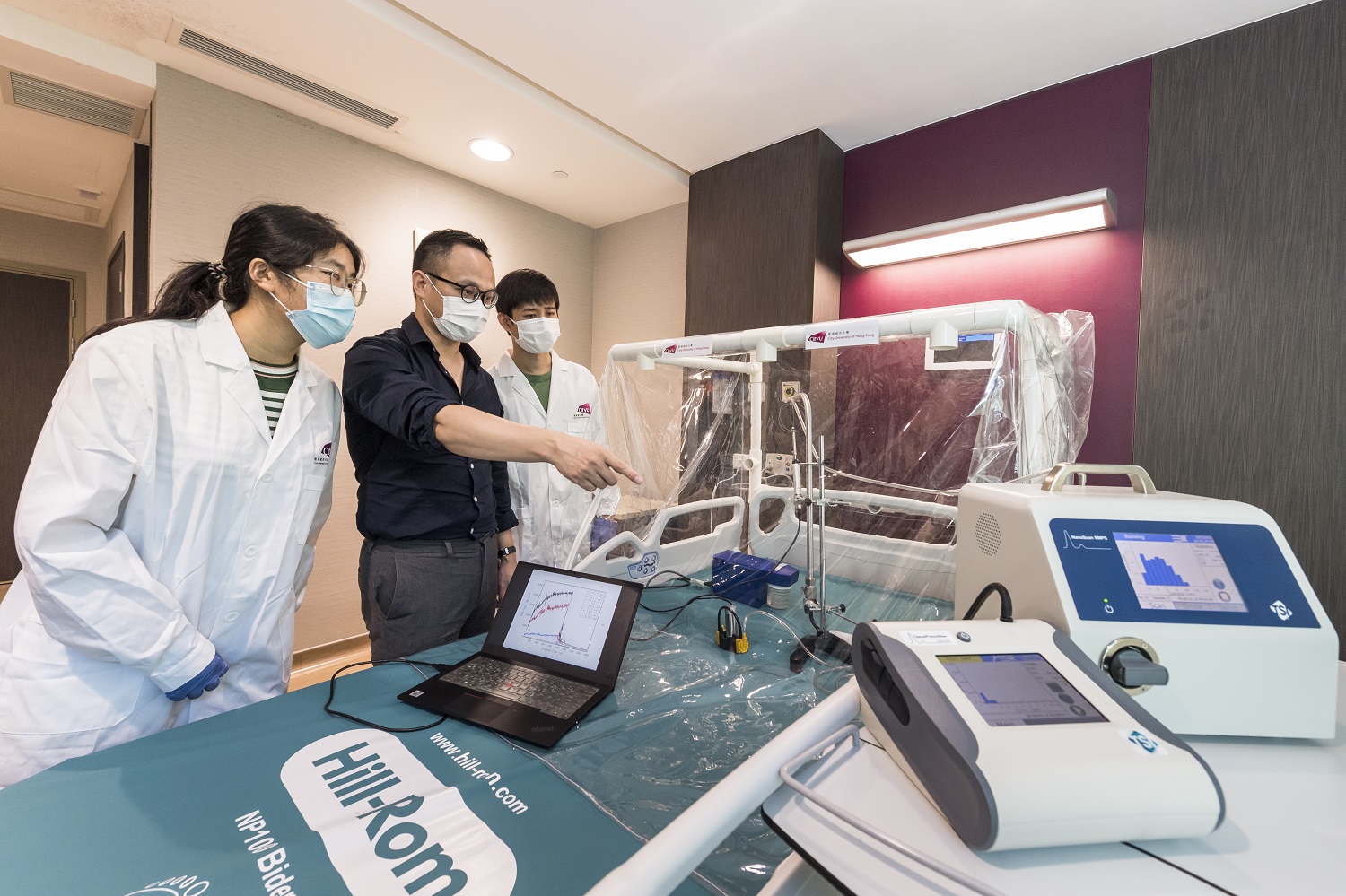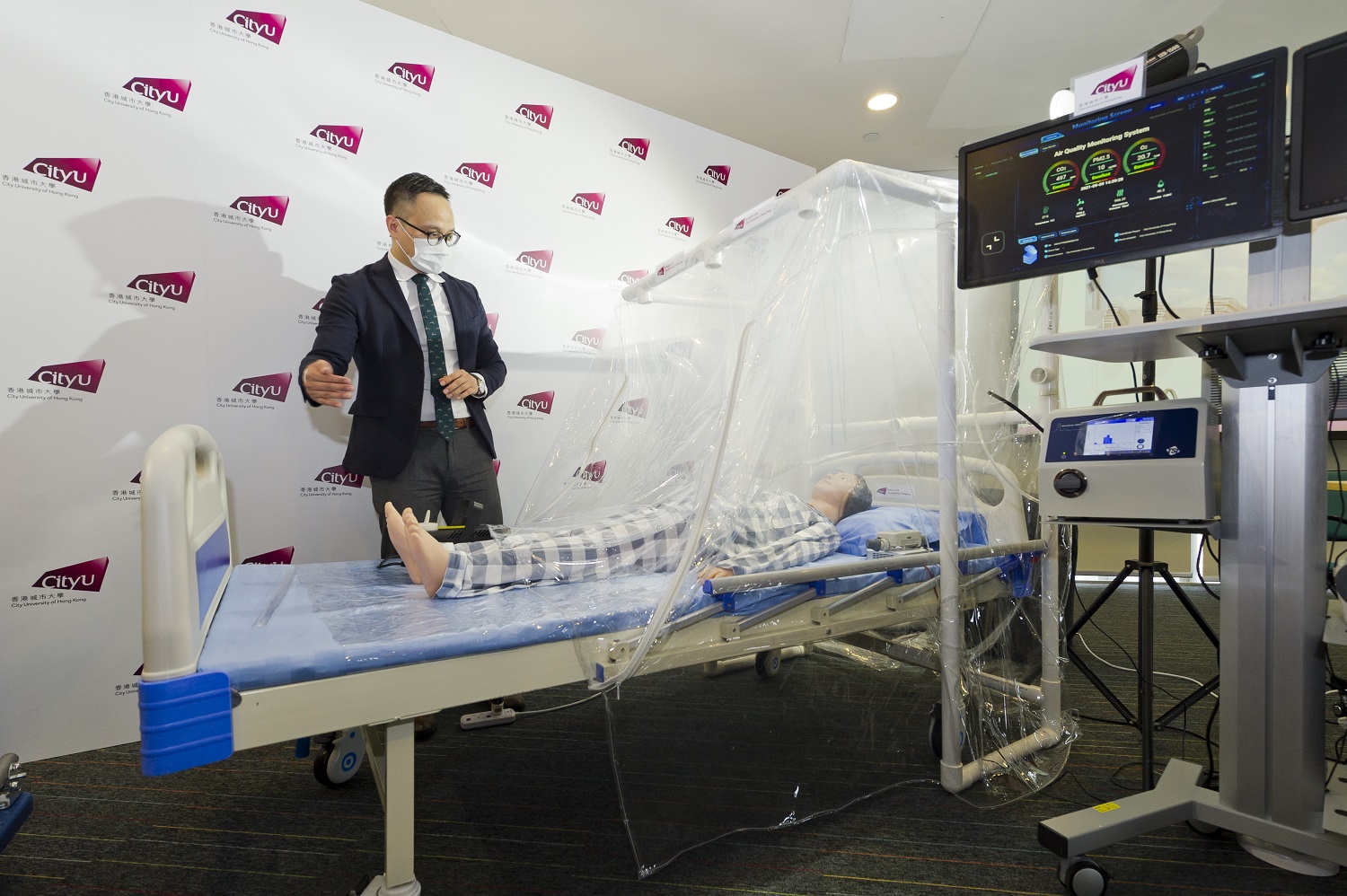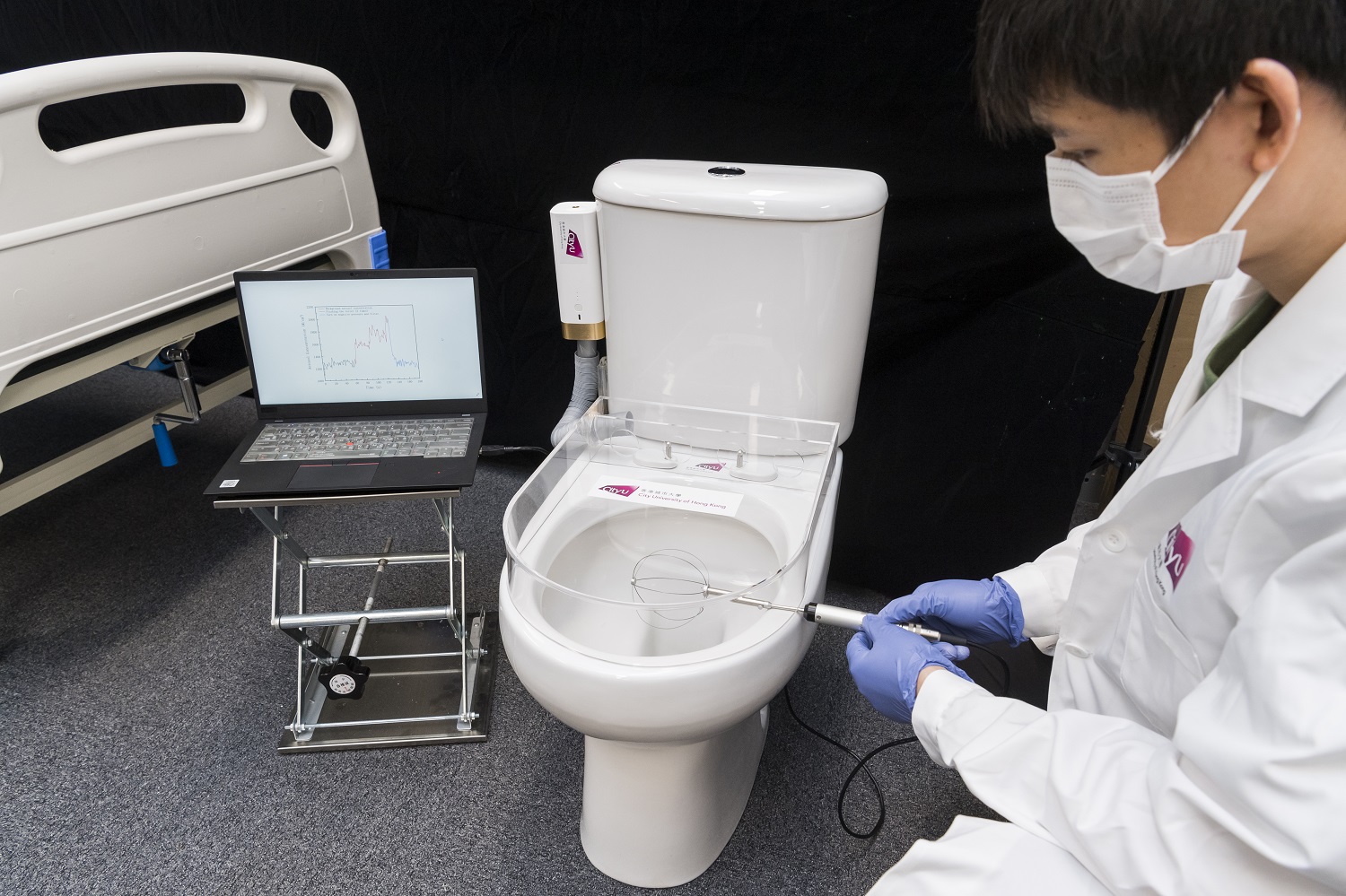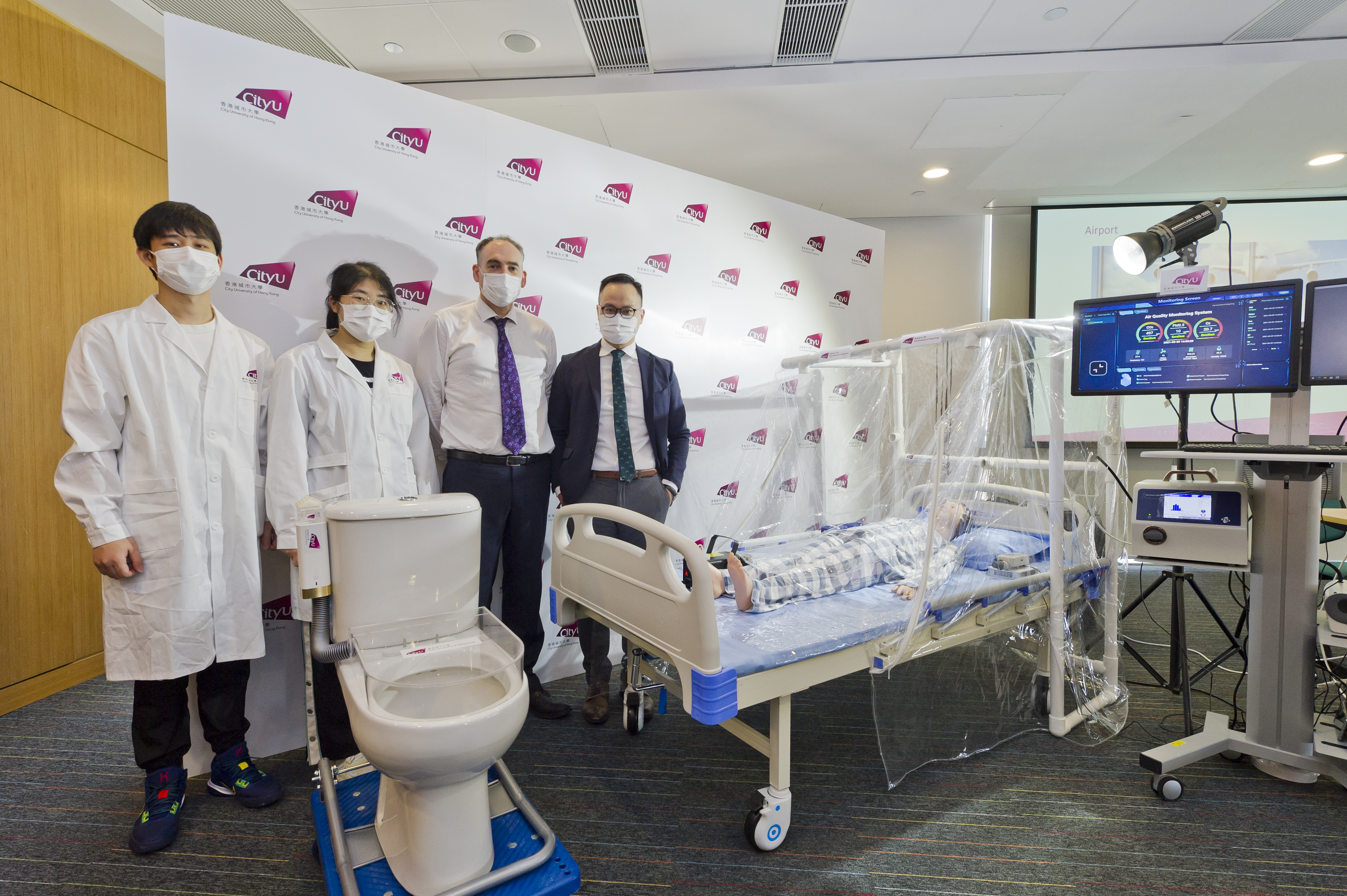CityU’s new, easily assembled fast-track ventilation system can thoroughly filter Covid-19
As there are still hundreds of thousands of new Covid-19 cases every day around the world, not to mention the continuous spread of variants, scientists are trying their best to combat the epidemic. A research team at City University of Hong Kong (CityU) recently developed a new ventilation system that can thoroughly filter viral particles and quickly stop the spread of Covid-19 in the air at low cost. The fast-track ventilation system is easy to install and can be used in high-risk places, such as hospitals and washrooms, effectively reducing the risk of virus transmission.
The enclosed ventilation system, developed by Dr Steven Wang, Assistant Professor in CityU’s Department of Mechanical Engineering (MNE), has a pipe frame made of polyvinyl chloride (PVC), with extraction ports. The system is equipped with a transparent PVC hood and high-efficiency particulate air (HEPA) filters. It can be placed on hospital beds to protect healthcare workers by effectively blocking and filtering viruses.
Dr Wang pointed out that a large quantity of aerosols are generated when medical workers perform cardiopulmonary resuscitation (CPR), tracheal intubation, or other respiratory tract-related treatment procedures for patients with Covid-19. As viruses spread via aerosols, this exposes healthcare workers to a high risk of infection.

Equipped with a transparent PVC hood with an anti-virus and superhydrophobic coating, Dr Wang’s system stops patients’ respiratory droplets from spreading outside the system. Through extraction ports on the pipes, the droplets are trapped in the HEPA filtering system, which removes the viruses and transmits purified air back to the ward.
System effectively reduces the transmission of viruses via aerosols
Experimental data shows that aerosols in an enclosed area can be thoroughly extracted by the system within two minutes. Its air exchange rate can be as high as 26 air changes per hour (ACH), higher than the rate of 12 ACH in a negative pressure ward. A trial has been conducted in Gleneagles Hospital Hong Kong since August. The results show that the system effectively stops viruses from spreading through aerosol transmission.
Setting up the system with pipes and a PVC hood is simple and takes only about five minutes per hospital bed. As inexpensive PVC is used for the pipe frame, and only one central HEPA filtering system is required for each ward with six beds, the cost for setting up the system in a ward is as low as a few thousand US dollars, much lower than setting up a negative pressure ward. The filter needs to be changed only once every six months.
Setting up the system with pipes and a PVC hood is simple and takes only about five minutes per hospital bed. (Video provided by Dr Steven Wang)

“This highly efficient, low-cost filtering system with simple installation can provide sufficient protection for healthcare workers,” said Dr Wang. “Our system will help relieve demand for negative pressure wards, particularly if there is a severe outbreak.” Dr Wang demonstrated in the press conference how white smoke in the PVC hood can be thoroughly extracted by the system within two minutes.
Dr Wang pointed out that when the negative pressure wards in hospitals are full, some Covid-19 patients may need to be placed in general wards or even in the corridors, exposing healthcare workers and other patients to a high risk of infection. “Our system will be very useful under such circumstances,” he said. “Each patient will have their own pipe frame and PVC hood to block and filter viruses.”
Professor Michael G Irwin, Daniel C K Yu Professor in Anaesthesiology in the Department of Anaesthesiology at The University of Hong Kong, also participated in the press conference and shared how Dr Wang’s system is being tested in Gleneagles Hospital Hong Kong.
“The Covid-19 virus is tiny and can exist in particles that are 5 μm or smaller, so they can remain airborne indefinitely under most indoor conditions,” said Professor Irwin. “Dr Wang's fast-track ventilation system provides a simple, cheap and fast solution to reduce the risk of the virus spreading, thus protecting healthcare workers in the hospital from being infected. We are currently undertaking trials on both manikins and patients and are looking at medical procedures that may generate aerosols.”
Dr Wang said that some medical staff suggested making the hood bigger. He will consider the various suggestions for modification so that medical staff have the maximum protection when performing medical procedures with a high risk of infection, such as intubation, and can even use the hood in surgeries. He added that the upgraded system will add graphene or UVC steriliser to the filter to kill the Covid-19 virus. The fast-track ventilation system can also be used in airports to “quarantine” suspected Covid-19 cases while waiting for test results.
Dr Wang has applied for a U.S. patent for the fast-track system. His research team will join HK Tech 300, CityU’s flagship innovation and entrepreneurship programme, to help transfer the technology into marketable products and to promote its application in Hong Kong and beyond.
Tiny filter system for toilet bowls
Dr Wang is also collaborating with Gleneagles Hospital on a plan to install a tiny filtering system for toilet bowls. He pointed out that 5.5 million aerosol droplets, on average, are produced by each toilet flush. Viruses may remain in aerosols in a washroom even when the toilet lid is down. If the toilet has been used by a person with Covid-19, the next user will have a very high risk of viral exposure. And the Covid-19 coronavirus can survive up to 72 hours on plastic surfaces.

Using Dr Wang’s filter system, aerosols produced by a toilet flush can be sucked out within five seconds via an extraction port installed on the toilet lid. The viruses are then trapped by the HEPA filter and inactivated by the UVC steriliser, thus significantly reducing the risk of virus transmission. The purified aerosol residues are then discharged through the drain. Dr Wang said that the tiny filtering system could be installed in public toilets of hospitals and schools, and that the filters would need to be changed only once every three to four months.
Dr Wang’s research on a fast-track vented enclosure system for Covid-19 patients in hospitals is one of four CityU projects funded by the Innovation and Technology Fund under the “Public Sector Trial Scheme for the Prevention and Control of COVID-19 in Hong Kong”.
Other members of Dr Wang’s research team are Deng Wei and Wang Hongbo, PhD students in the MNE. Faculty members at the University of Cambridge and Imperial College London helped conduct numerical simulations for Dr Wang’s system. With the assistance of Professor Michael G Irwin, the system is being tested in Gleneagles Hospital Hong Kong.

